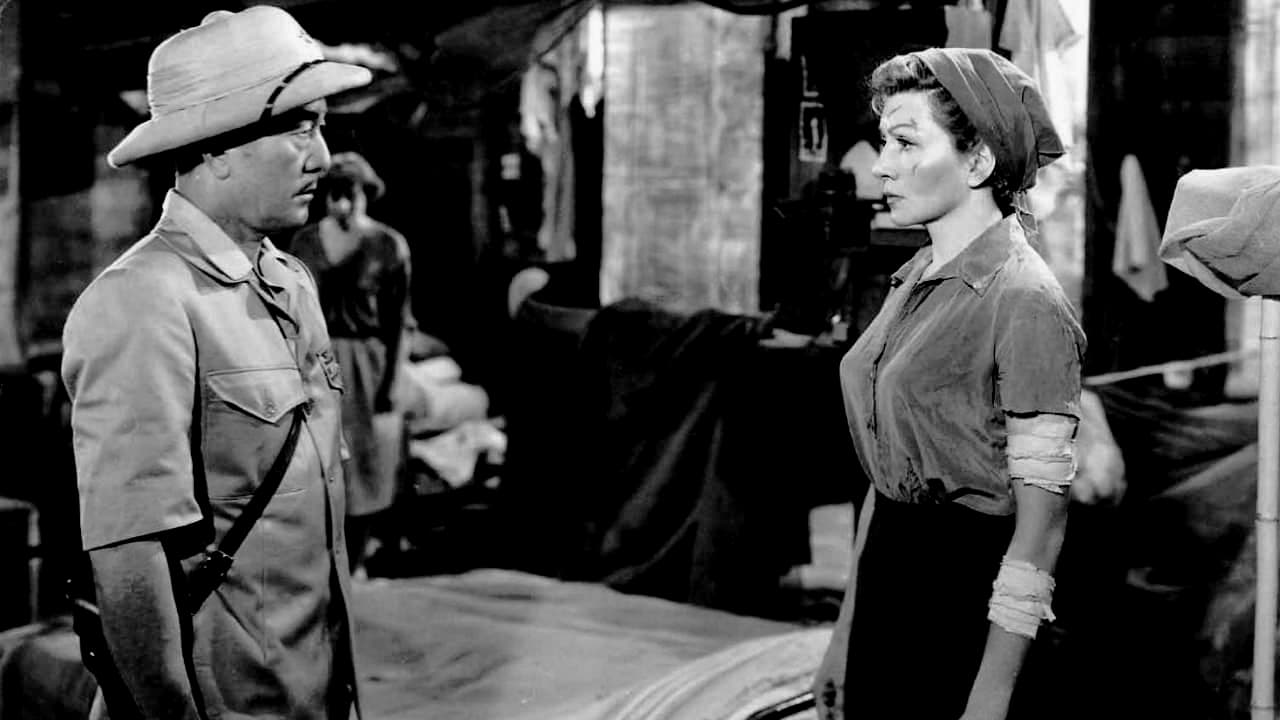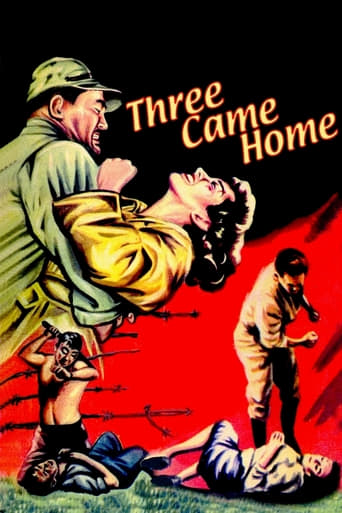Teringer
An Exercise In Nonsense
filippaberry84
I think this is a new genre that they're all sort of working their way through it and haven't got all the kinks worked out yet but it's a genre that works for me.
Dana
An old-fashioned movie made with new-fashioned finesse.
mark.waltz
Long before the first Holocause movie or the German prison camp classic "Stalag 13" (or TV's "Hogan's Heroes") came this film documenting the horrors of a Japanese detention camp, actually several, as European residents (and one American) of Borneo are forced out of their homes by the invading Japanese and separated into two camps-one for women and children, the other for husbands. This concentrates mainly on the women's camp, here a real-life survivor who told her own story in book form and soon after saw it adapted for the screen.Claudette Colbert plays Agnes Newton Keith, the courageous woman who stood up to Japanese brutality and almost paid for it with her life. She finds a kinsman of sorts with the camp's very human Japanese commander (Sessue Hayakawa) who admires her for an earlier book she wrote and makes her an occasional confidante. But other Japanese soldiers and guards are obviously envious of this friendship, and make her pay in quite inhuman and degrading ways. The film hits its emotional high when Hayakawa reveals to her the fate of his family who moved from Tokyo to Hiroshima to disastrous results.As great as Colbert is, she never looses her movie star good looks while the other women around her look as if they've been beaten by the life they've been forced into. Colbert's hair style remains impeccable, false eye lashes never slip, and she barely has any dirt on her face even in the most brutal of torture scenes and one where she scoots underneath a fence to meet her husband (Patric Knowles) for just one minute. It is Hayakawa who garners the highest praise, especially in climactic scene where he grieves for his family while giving several American children (including Colbert's son) an impromptu party just before the end of the war. No matter what your feeling towards the Japanese as far as World War II is concerned, you can't help but be touched by his breakdown, especially in light of his kindness to Colbert.The gripping scene between Colbert and Knowles where she risks everything to see him for one minute is another touching scene, as prison guards arrive at the women's bunk house to check on Colbert's son, desperately in need of Quinine. That and other tense scenes will have you on the edge of your seat.
vincentlynch-moonoi
This is a rather remarkable film because it is a basically true story, and much of it was filmed in locales where it actually took place.Made in 1950, it is rather faithfully based on the memoirs of Agnes Newton Keith. It tells the story of her family's ordeal of being civilian POWs of the Japanese after the Japanese invasion of what is today Indonesia. Keith and her young son were interned at a camp in Sarawak, which was not liberated until September, 1945. Her husband had been a British official in the region and was interned at a different camp for men.None of us can imagine what it must have been like for the Brits taken prisoner, but this film gives one a pretty good idea. As I watched the film several things occurred to me. First that these women and children -- at least according to this film -- had to live much as many "locals" live in southeast Asia today "upcountry". I lived in Thailand for a while, and when I visited my partner's village in 2010, I saw conditions much like some depicted in this film. Of course, it is different when you are prisoner. I also detected racial tension, though subtle, in this film.Surprisingly, the most touching scenes of the film were when the Japanese camp commandant learns this his entire family was killed in the atomic bombing of Hiroshima, and he takes 3 of the British children to his temporary home near the camp for a sort of picnic.As always, Claudette Colbert was excellent here, as was Sessue Hayakawa, who plays a very different role than his character in "The Bridge On The River Kwai".This is not a film I want on my DVD shelf, but it is very good.
blanche-2
Claudette Colbert stars in "Three Came Home," a 1950 WW II drama also starring Sessue Hayakawa and Patrick Knowles. It's the true story of Agnes Keith, who endured almost four years in a Japanese prisoner of war camp in Sandakan, Borneo with her little son when the Japanese marched into Borneo in 1942.Unlike many Hollywood WW II films, this one is fairly unrelenting in its depiction of beatings, shootings, attempted rape, going through the garbage for food, malaria, and, in the case of these women, many of them not knowing what happened to their husbands. It also captured the fear and pain of the women leaving theirs family home and having no idea where they're being sent and if any of them will ever see their husbands again."Three Came Home" sticks as closely to Agnes' real story as possible, with the usual dramatic license. In reality, the family was in Canada when war was declared, and Harry, Agnes' husband, was ordered back to Borneo, where he worked for the government. The couple was separated, but not the whole time - Harry eventually was imprisoned at the later camp in Kuching. Their son George was an infant, having been born in 1940.In real life, Keith was criticized for being "too polite" to the guards, by an older woman in the camp - this is alluded to in the film. It was also understandable, since she needed to provide for her son. She did occasionally receive extra food and medicine for him. Sessue Hayakawa, the head of the camp, is an admirer of Agnes' from reading one of her books. It is his depiction of a humane man that takes "Three Came Home" out of the realm of good guys/bad guys. Hayakawa gives a beautiful performance as an American-educated soldier with family difficulties.But the star is Colbert in a workhorse role. She is magnificent - dignified, desperate, protective of her son, and resolute. Though she is thought of as a great star today, I wonder if she isn't perhaps underrated because of the classic comedies she did. Also, as an actress, she never made it look difficult, though it was, and she had a strong commitment to her work. This film lost her the part of Margo in "All About Eve," as the back injury she suffered during one of the beating scenes prevented her from doing the role. Sadly, because of her age - 43 when this film was released - "Three Came Home" was actually her last lead in a major film.After the war, the Keiths had another child, a girl; Agnes died in 1982 at the age of 80, and Harry died the same year. Agnes' story is one of survival, heroism, and determination, well conveyed here, thanks to a strong script, strong performances, and beautiful direction by Jean Negulesco.
Martin Bradley
This P.O.W movie is unusual in that it's set in a Japanese prisoner-of-war camp that housed women and children on the island of Borneo and is based on a true story. It's directed, superbly, by Jean Negulesco and it may be his best and most under-valued film. What's most remarkable is that it treats the Japanese with a considerable degree of sympathy, certainly not as heroes but neither as the monsters of other similar pictures.There are a number of superb sequences that build both character and real tension and even the clichés of the prison camp genre are very subtly subverted. It may be no masterpiece but it stands head and shoulders above many more famous films. First-rate performances, too, from Claudette Colbert in the central role of the sole American prisoner and from Sessue Hayakawa, as outstanding here as the camp commandant as he was in "The Bridge on the River Kwai".

